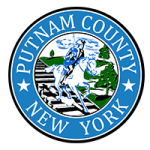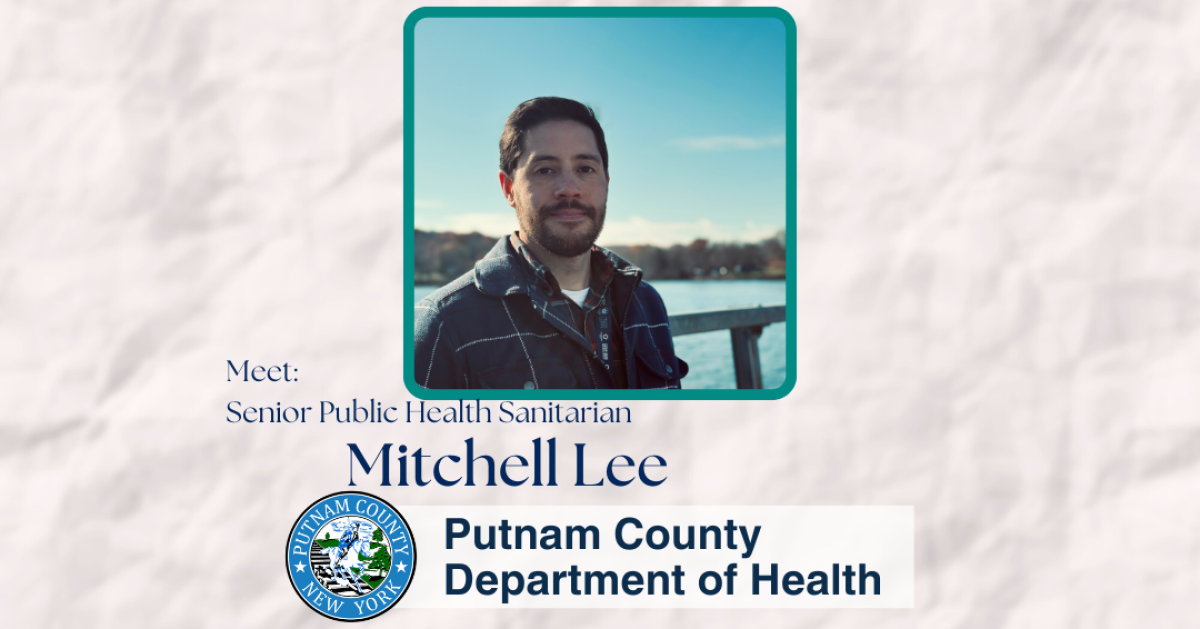
News & Press Releases
The Putnam County Department of Health is made of several divisions all working towards improving and protecting the health of the community. Click on one of the options below to learn more about that division.

PCDOH Highlights Rabies Prevention with Staff Spotlight
The Putnam County Department of Health continually strives to prevent illness in the community. Public Health Sanitarians perform this task in a variety of ways, including a multi-faceted approach to rabies prevention. Senior Public Health Sanitarian Mitchell Lee talks about his work at the health department in the rabies program.
What is your favorite part of working as a Public Health Sanitarian?
I find satisfaction in the fact that the work we do has a real impact on people’s lives and the local community. A lot of sanitarian work is prevention, so you don’t exactly see the fruits of your labor on a daily basis. However, every day we can prevent or mitigate a disease outbreak, a developing public health issue, or a public health emergency is a victory.
Is there a particularly rewarding experience you’d like to share?
Rabies is a lethal disease and some people become very frightened when they believe they, their child, or a loved one has been exposed to a bat or other animal known to be a potential carrier of rabies. Quite a few people will read about bats and rabies on the internet and call us at 2 o’clock in the morning in a panic. It’s a very rewarding experience to work with these people through their specific situations and alleviate their fears. Some of these phone calls can be life or death situations so the rabies response needs to be handled properly and timely. I know my colleagues get their fair share of high pressure cases and it’s also very rewarding to see them succeed as well.
As a side note, there’s also the story of a man cutting firewood with a chainsaw when a raccoon ran out of the woods and attacked his dog. The man successfully defended his dog and we were able to collect the raccoon for rabies testing. The raccoon tested positive for rabies and we were able to provide treatment to prevent further rabies infection.
What does your day-to-day work look like?
I work in a variety of different programs and I work both in the office and out in the field doing food, camp, temporary residence, or lead inspections. When a person or their pet has been bitten by another pet, had contact with a bat, or other wild animal, we investigate and work with residents, animal control, police, veterinarians, and hospital staff in a timely manner to prevent any person or pet from becoming infected and dying of rabies. We process and ship rabies specimens for laboratory testing. We also make sure all our rabies reports and medical records are complete and up to date.
What do you wish the public knew about your job?
An ounce of prevention is worth a pound of cure. People can avoid rabies exposure and shots by bat proofing their homes, keeping their pets up to date on vaccinations, and by not handling or feeding certain wild animals. The wild animals that most commonly carry rabies in the United States are raccoons, skunks, bats, and foxes. The PCDOH offers 3 free rabies clinics per year for dogs, cats, and ferrets!
What’s the best piece of advice you’ve ever received?
Sometimes we encounter strange and unique situations where there is no clear-cut answer or response. This type of situation could be a patient who’s ill in the hospital under mysterious circumstances and this person may have had bats living in their house months prior. Or a resident may be outside at night and get hit in the head by an unknown object or animal. Was it a giant moth, bird, or possibly a bat? These are grave situations so the best thing to do is to take some time to gather as much information as possible, think, and consult supervisors and other professionals in the rabies field to come up with best treatment plan or course of action for that situation.
What have been some of the most important lessons you’ve learned throughout your career?
Working in Public Health has taught me that Health Department staff and the public will continue to face new and unique public health challenges in the future. When times get tough, a public health professional is compelled to evaluate situations so they can apply what they’ve learned. As time goes on, new diseases and public health issues will continue to emerge and evolve and we need to continue to learn, improvise, adapt, and overcome.
As Mr. Lee mentioned, the health department hosts 3 free rabies clinics each year for dogs, cats, and ferrets. In 2023, 325 pets were protected against the deadly disease. If you have an encounter with a bat or other wild animal, call the health department right away at 845-808-1390. If you are calling outside of business hours, select option 3 to be connected to the emergency line. Additional information about rabies prevention can be found at putnamcountyny.com/health/rabies
Additional Articles
-
 New Community Health Survey Asks Residents: How Healthy Are We?
New Community Health Survey Asks Residents: How Healthy Are We? -
 Suicide Prevention in Putnam and Beyond
Suicide Prevention in Putnam and Beyond -
 Health Department Spotlight: Danny Reis
Health Department Spotlight: Danny Reis -
 Health Department Warns Residents About the Dangers of Lead Poisoning
Health Department Warns Residents About the Dangers of Lead Poisoning -
 Prevent mosquito breeding—dump standing water after rain
Prevent mosquito breeding—dump standing water after rain -
 Spotlight on the Public Health Corps Fellowship
Spotlight on the Public Health Corps Fellowship -
 The PCDOH Makes Summertime Living Easy…and Safe
The PCDOH Makes Summertime Living Easy…and Safe -
 Heat-Related Illnesses 101
Heat-Related Illnesses 101 -
 Tips for Staying Healthy During a Heat Alert
Tips for Staying Healthy During a Heat Alert -
 Free Rabies Vaccination Clinic Scheduled for July 13
Free Rabies Vaccination Clinic Scheduled for July 13
Welcome Message
The mission of the Putnam County Department of Health is to improve and protect the health of our community.
We strive to prevent the spread of disease, protect against environmental hazards, promote healthy lifestyles, ensure access to quality health services, and respond to disasters.
We encourage you to explore our website and contact us if you have any questions.
In the event of an emergency, Health Department staff are available 24/7. Please call 845-808-1390 to report a public health emergency, rabies exposure, communicable disease, water outage or sewer overflow.
If you are a member of the media and would like to contact the health department, please email
Contact the Department of Health
-
Office | 845.808.1390
-
Fax | 845.278.7921
-
Fax (Nursing) | 845.279.4104
-
Address | 1 Geneva Rd, Brewster, NY 10509
